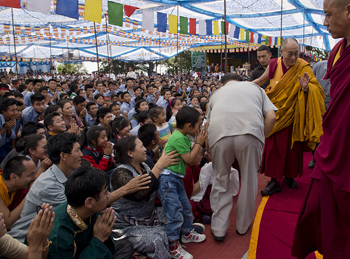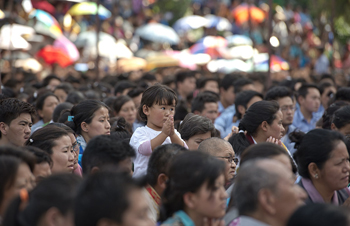
His Holiness the Dalai Lama departing from the teaching grounds after conferring the Avalokiteshvera Empowerment at Upper TCV School
Photo: Tenzin Choejor/OHHDL
His Holiness the Dalai Lama’s annual Summer Teaching at Tibetan Children’s Village (TCV) School took place this year from June 4-6. The Summer Teaching was introduced by His Holiness in 2007, and is regarded as one of the most valuable and productive annual events in the TCV calendar.
The teaching gives the youngsters an introduction to Buddhism, and this year focussed on The Heart Sutra (sherab nyingpo) and Praise to the Intelligent One (Manjushri Prayer gang loma). The number of participants in the Summer Teaching is snowballing every year and this year included students from all schools in Himachal as well as about 100 students from various Sambotha and CST (Tibetan run) schools, making a total of around 3,500 children and students.
His Holiness expressed concern over the degeneration of interest in Buddhism among Tibetan young people. He said that only a few Tibetans born in exile enrol into monasteries these days, but that it is not mandatory to become a monk to study Buddhism. He urged the students present at the teaching to study Tibetan Buddhism as an educational field instead of simply following a blind faith. He advised students: “based on reality and your own experience you can study the nature of mind, and ways to control it, and you shall be a happier person once you understand the essence of Tibetan Buddhism.” His Holiness allowed time for the students to interact with him, and to answer their questions.
On the third day of the teaching, he gave the Avalokiteshwara initiation which was held at the main basketball ground to accommodate more people. The teaching was followed by the launch of the Central Tibetan Administration’s Middle Way Approach Campaign by the elected head of the Tibetan people, Sikyong Dr Lobsang Sangay, with a formal presentation to His Holiness of the educational materials for the campaign.
The Summer Teachings were initiated by the Buddhism Introductory Committee of Dharamsala, a voluntary committee formed in 2006 to help Tibetan youngsters to stay in touch with the Buddha Dharma and Tibetan Buddhist culture by arranging regular introductory Buddhism classes.





 Print
Print Email
Email